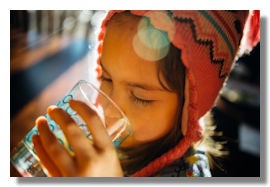Drinking Water

Nebraska’s Drinking Water Section is dedicated to safe drinking water for all of Nebraska’s public water consumers. We work together with water systems, communities, and other state and federal partners to ensure we have reliable and safe drinking water.
Nebraska Drinking Water Sections
What is it that we do?
From department engineers who approve construction projects, to field staff who inspect water systems, and water specialists who monitor water testing, we ensure that public water consumers have drinking water that meets all state and federal standards. This could not be accomplished without the cooperation and dedication of the operators of Nebraska’s public water systems and other partners from the Nebraska Rural Water Association, MAP, the Nebraska Chapter of the American Water Works Association, and the League of Municipalities.
What are the types of public water systems?
Community Water Systems — cities, towns, and villages
Non-Transient Non-Community Water Systems — schools, office buildings, and hospitals, if they have their own well. They serve people on a temporary basis, a non-transient population.
Transient Water Systems — gas stations, rest areas, hotels, and restaurants, if they have their own well. They serve people who are just passing through, a transient population.
Note: Private Wells are not regulated.
What are the sources of Nebraska’s drinking water?
The majority of public water systems in Nebraska get their water from groundwater, underground aquifers. Less than 10 percent utilize surface water sources like lakes and rivers. Of note however, is that the majority of our population, Omaha and Lincoln, drink both surface and groundwater. Water coming from a surface water source is always filtered and treated before it is deemed safe to drink. Water originating from a groundwater source may be treated, depending upon the quality of the groundwater.
Useful links and resources
- 2026 Training Schedule
- Active Public Water Operator Lookup
- Application for Water Operator Reinstatement
- Application for Water Operator Training & Exams
- Contingency/ Emergency Response Plan for Community Water Systems
- Contingency/ Emergency Response Plan for NTNC Water Systems
- Critical Information Emergency Contact List
- Utility Board Training Video
- The Water Spout Newsletter
Current happenings
The Nebraska Department of Water, Energy, and Environment (DWEE) has been awarded funds to test for and reduce lead in drinking water in schools and childcare facilities in Nebraska.
These funds are provided by the U.S. Environmental Protection Agency’s (EPA) Water Infrastructure Improvements for the Nation Act grant.
The grant funds are used to pay for sample kits and laboratory analysis of the drinking water. Additional grants are available to fund the removal and replacement of water fixtures that have tested high for Lead. See DWEE’s Lead Testing and Reduction Grant Program page for more information.
Additional information about this grant program can be found on EPA’s website: https://www.epa.gov/dwcapacity/wiin-grant-reduction-lead-exposure-drinking-water-under-sdwa-section-1459b.
